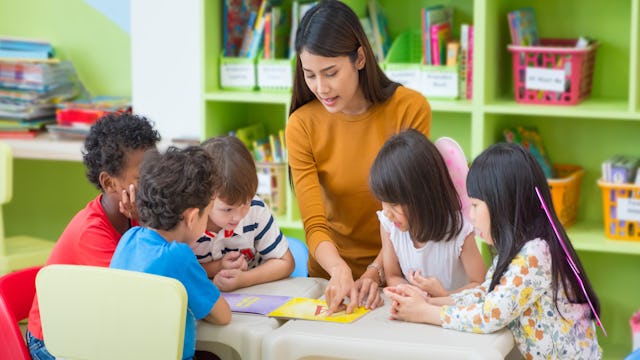It Turns Out Full-Day Kindergarten Is No Better Than Half-Day

Researchers found no significant differences in kids attending half-or full-day programs
Decisions regarding our children’s education can be stressful, and the concern about what’s best for our kids often starts immediately after they’re born (or as soon as we find out we’re pregnant). There are so many potential classes, daycares, educational learning tools — it can be completely overwhelming. Then comes the question of whether to send them to half or full day kindergarten, and parents have Even More Feelings. But a recent study says don’t sweat it, there’s no difference in our kids eventual outcome.
A University of Hong Kong study found kids who attended full-day kindergartens are not smarter or more well-adjusted than those attend half-day programs. Parents, on the other hand, believe it’s better for our kids to be in school longer, according to the research.
For the study, researchers selected 346 boys and girls (ages 3 to 5) attending full- or half-day programs at 15 kindergartens throughout Hong Kong, following them from 2015-2017 and their finding surprised many parents. According to researchers, there was no significant difference found in children’s language, cognitive, physical, social, and emotional development.
For their parents (around 300 interviewed), two-thirds wanted the option of full-day programs, which are not readily available or funded in the city. Eight in ten felt it would help with their children’s social and emotional development and almost all felt their kids would have better “self-care skills.”
Of course, for all parents, we need to consider our kids’ readiness to attend as well as the financial impact, as many full-day programs are not fully funded and half-day programs require working parents to fund other childcare options during the day. It’s a deeply personal decision but also one many parents feel pressure to get right for the sake of our kid’s future education opportunities.
And the data out there can be conflicting. According to the National Association of School Psychologists (NASP), “a good quality half-day kindergarten program will offer sufficient experiences for the development of strong school readiness and social skills, while also providing time for other life experiences within the home or other community settings. But they also believe a full-day program may provide “more ideal preparation for formal education.”
And while there are still many educators and statistics to support the notion that full-day programs prepare our kids more for elementary school, there are many opportunities for learning at home that can benefit our kids if full-day programs either aren’t available or right for our kids. And with continuing studies like this, the arguments over which is ultimately “better” for our kids can be put to rest.
This article was originally published on